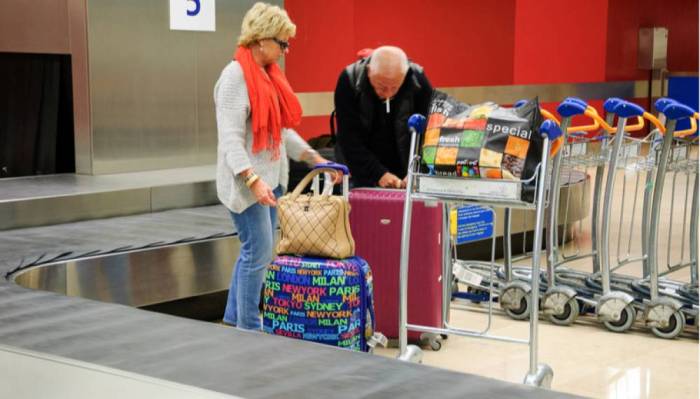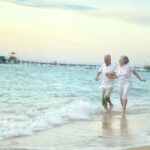Senior Travel Canada unveils a world of breathtaking landscapes and enriching experiences tailored for mature adventurers. This comprehensive guide navigates the best destinations, transportation options, and activities, ensuring a comfortable and memorable journey across Canada’s diverse provinces and territories. From the rugged beauty of the Rockies to the vibrant culture of Quebec City, we delve into the practical considerations of budgeting, health, and safety, empowering seniors to plan their ideal Canadian escape.
We explore various transportation methods, comparing the pros and cons of trains, buses, rental cars, and domestic flights, factoring in accessibility and comfort for senior travelers. Detailed itineraries showcase the possibilities, while addressing potential challenges and offering practical solutions for a seamless experience. The guide also provides a realistic cost breakdown for different travel styles, along with tips for finding affordable accommodations and activities.
Popular Senior Travel Destinations in Canada

Canada offers a diverse range of destinations perfectly suited for senior travelers seeking relaxation, cultural immersion, and breathtaking natural beauty. Factors such as accessibility, healthcare availability, and manageable activity levels are crucial considerations when planning a senior travel itinerary. This analysis highlights five provinces and territories particularly well-equipped to cater to the needs of older adults.
Top Canadian Provinces and Territories for Senior Travelers
The following table summarizes five ideal Canadian locations for senior travel, considering ease of navigation, healthcare access, and physical activity demands. Cost estimates are averages and can vary depending on travel style and season.
| Province/Territory | Key Attractions | Accessibility Features | Average Cost (CAD per week, excluding flights) |
|---|---|---|---|
| British Columbia | Vancouver’s Stanley Park seawall, Victoria’s Butchart Gardens, scenic coastal drives | Well-maintained pathways, accessible transportation options in major cities, numerous senior-friendly accommodations | $1500 – $3000 |
| Nova Scotia | Peggy’s Cove lighthouse, historic Halifax Citadel, Cabot Trail scenic drive | Generally flat terrain, accessible attractions, smaller towns offer a slower pace | $1200 – $2500 |
| Prince Edward Island | Anne of Green Gables sites, charming coastal towns, Confederation Bridge | Relatively flat terrain, good road conditions, many accessible accommodations | $1000 – $2000 |
| Ontario | Niagara Falls, Toronto’s CN Tower and museums, Thousand Islands | Excellent public transportation in major cities, accessible attractions, wide range of senior-friendly accommodations | $1400 – $3000 |
| Quebec | Quebec City’s Old Town, Montreal’s historic districts, charming villages in the Eastern Townships | Good public transportation in cities, many accessible attractions, but some older buildings may lack full accessibility | $1300 – $2800 |
Suitability for Seniors: Transportation, Healthcare, and Physical Activity
British Columbia, with its well-developed public transportation systems in Vancouver and Victoria, offers easy access to many attractions. Nova Scotia and Prince Edward Island boast generally flat terrain, making them suitable for those with limited mobility. Ontario’s major cities provide excellent public transport and accessible attractions. Quebec’s cities also offer good public transportation, though navigating older, cobblestone streets may require more effort.
Healthcare access is generally good across all five locations, with hospitals and clinics readily available. The level of physical activity required varies greatly depending on the chosen activities; many attractions offer options for all levels of fitness.
Senior-Friendly Accommodation Examples
Numerous hotels and resorts across these provinces and territories cater specifically to senior travelers. Examples include: The Fairmont Empress in Victoria, BC (known for its elegant atmosphere and accessible rooms); several resorts in the Cabot Trail area of Nova Scotia offering accessible cottages; numerous bed and breakfasts in Prince Edward Island offering personalized service; various hotels near Niagara Falls with accessible features; and several hotels in Old Quebec City offering adapted rooms.
Many smaller, family-run establishments also provide excellent senior-friendly accommodations and services.
Budgeting and Planning a Senior Trip to Canada: Senior Travel Canada
Planning a senior trip to Canada requires careful consideration of various factors, most significantly budgeting. A well-structured budget ensures a stress-free and enjoyable experience, allowing seniors to fully appreciate the country’s diverse landscapes and cultural offerings. This section provides a detailed breakdown of costs and strategies for maximizing value.
Estimated Costs for a 10-Day Senior Trip to Canada
The following table provides a sample estimate for a 10-day trip to Canada. Costs can vary significantly depending on travel style, time of year, and specific destinations. These figures represent mid-range spending and can be adjusted based on individual preferences and budget constraints.
| Category | Item | Estimated Cost (CAD) | Notes |
|---|---|---|---|
| Accommodation | Hotels/Motels (Mid-Range) | $1000 | Average $100/night. Consider Airbnb or guesthouses for potential savings. |
| Transportation | Flights (Round Trip) | $800 – $1500 | Prices vary greatly depending on origin and destination. Booking in advance often secures better deals. |
| Transportation | Internal Travel (Train/Bus/Rental Car) | $500 | Consider train travel for scenic routes; buses are generally more budget-friendly. Rental car costs depend on location and duration. |
| Activities | Entrance Fees/Tours/Excursions | $400 | Allocate based on chosen activities; consider free activities like hiking or exploring parks. |
| Food | Groceries & Restaurants | $700 | Mix grocery shopping with restaurant meals to balance cost and convenience. |
| Miscellaneous | Souvenirs, incidentals | $200 | Budget for unexpected expenses. |
| Total Estimated Cost | $3600 – $4100 | This is a mid-range estimate. |
Finding Affordable Accommodation and Travel Options
Seniors can significantly reduce travel costs by exploring budget-friendly accommodation and transportation alternatives. Websites like Booking.com, Expedia, and Airbnb offer a wide range of options at various price points. Consider staying in hostels (for the budget-conscious), guesthouses, or bed and breakfasts for a more intimate and potentially cheaper experience than hotels. For transportation, opting for buses or trains over flights for shorter distances can save considerable money.
Utilizing public transportation within cities is another cost-effective approach. Consider traveling during the shoulder seasons (spring and fall) to avoid peak-season surcharges on flights and accommodations.
Creating a Realistic Budget for Different Travel Styles, Senior Travel Canada
Budgeting for a senior trip to Canada depends heavily on the preferred travel style.
A luxury trip might cost upwards of $8,000-$12,000 or more for 10 days, including first-class flights, high-end hotels, private tours, and fine dining.
A mid-range trip, as exemplified in the table above, would typically fall within the $3,600-$4,100 range.
A budget trip, focusing on affordable accommodations like hostels or camping, utilizing public transportation, and packing meals, could be accomplished for $2,000-$3,000.
These are estimates, and actual costs will depend on individual choices and spending habits. Careful planning and pre-booking of flights and accommodations are crucial to securing the best deals and sticking to the budget.
Health and Safety Considerations for Senior Travelers in Canada

Planning a trip to Canada as a senior requires careful consideration of health and safety aspects. The vast and varied landscape, ranging from bustling city centers to remote wilderness areas, presents unique challenges and necessitates proactive planning to ensure a smooth and enjoyable journey. This section Artikels potential health risks, the importance of travel insurance, and readily available resources for medical emergencies.
Potential Health Risks and Preventative Measures
Canada’s diverse climate and geographical features can pose specific health risks for seniors. Extreme temperatures, both hot and cold, can exacerbate pre-existing conditions such as cardiovascular and respiratory illnesses. Altitude sickness can also be a concern in mountainous regions. Furthermore, the risk of falls increases with age, particularly on uneven terrain or icy surfaces. Proactive measures are crucial.
These include consulting a physician before travel to discuss any existing health conditions and obtain necessary vaccinations or medications. Packing appropriate clothing for varying weather conditions, including layers for warmth and protection from the elements, is essential. Choosing accessible and well-maintained accommodation and transportation options can also significantly mitigate risks associated with mobility limitations. Staying hydrated, particularly in hot weather, and being mindful of physical exertion are equally important.
Finally, carrying a comprehensive first-aid kit and familiarizing oneself with local emergency services is prudent.
Importance of Travel Insurance for Senior Travelers
Comprehensive travel insurance is paramount for senior travelers in Canada. Healthcare costs in Canada, while publicly funded, can still incur significant expenses, particularly for non-residents requiring specialized care or extended hospital stays. Travel insurance covers medical emergencies, evacuations, and repatriation, protecting seniors from potentially crippling financial burdens in the event of an unexpected illness or injury. Furthermore, travel insurance often includes coverage for trip cancellations or interruptions due to unforeseen circumstances, providing financial security and peace of mind.
Policies should be carefully reviewed to ensure adequate coverage for medical expenses, emergency medical evacuation, and repatriation. It’s advisable to choose a policy with a high coverage limit, considering the potential costs associated with senior healthcare.
Resources and Services for Medical Emergencies
Canada has a well-established healthcare system. In case of a medical emergency, dialing 911 will connect travelers with emergency medical services. Most major cities and towns have well-equipped hospitals and clinics. For less urgent medical needs, walk-in clinics and doctor’s offices offer convenient access to healthcare professionals. Many hotels and tourist information centers can provide assistance in locating nearby medical facilities.
Furthermore, Canadian pharmacies are readily available for prescription refills or over-the-counter medications. For travelers with pre-existing conditions, carrying a comprehensive medical history and a list of current medications, including dosages, is crucial. This information facilitates efficient treatment in case of an emergency. Finally, informing family or friends of travel plans and itinerary can provide additional support and assistance should unforeseen circumstances arise.
Illustrative Examples of Senior-Friendly Itineraries
Canada offers a wealth of experiences perfectly suited for senior travelers, balancing captivating sights with accessibility and comfort. These itineraries prioritize ease of movement and enjoyable pacing, ensuring a memorable and stress-free trip.
Seven-Day Canadian Rockies Itinerary: Natural Beauty and Accessibility
This itinerary focuses on the breathtaking scenery of Banff and Jasper National Parks, carefully considering the needs of senior travelers. Transportation utilizes a combination of scenic drives and comfortable shuttle services to minimize physical exertion. Accommodation choices prioritize ease of access and amenities catering to older adults.Daily Activities:
- Day 1: Arrival in Calgary, transfer to Banff via comfortable shuttle service. Check into a hotel with accessible rooms and amenities in Banff townsite. Afternoon exploring Banff Avenue, enjoying the shops and views of the Bow River. Evening relaxation at the hotel or a gentle stroll along the Bow River pathway.
- Day 2: Scenic gondola ride up Sulphur Mountain (consider alternative activities if gondola queues are extensive or the weather is unsuitable). Enjoy panoramic views of Banff and the surrounding mountains. Afternoon: gentle walk along the boardwalk at Lake Minnewanka. Evening: Dinner at a restaurant with accessible seating.
- Day 3: Drive along the scenic Bow Valley Parkway to Johnston Canyon. Explore the lower falls via paved walkways; consider skipping the upper falls hike if mobility is limited. Afternoon: Relax at the Banff Upper Hot Springs, known for its therapeutic waters and accessible facilities. Evening: Enjoy a relaxing evening in Banff.
- Day 4: Scenic drive to Lake Louise. Enjoy the views of the iconic turquoise lake from the lakeshore. Consider a boat tour on Lake Louise (check for accessibility features). Afternoon: Explore the Fairmont Chateau Lake Louise (exterior only if time is limited or access to the interior is challenging). Evening: Return to Banff.
- Day 5: Drive to Jasper National Park via the Icefields Parkway (consider a guided tour for a more relaxed experience). Stop at viewpoints along the way, taking advantage of accessible viewpoints and rest stops. Check into a senior-friendly hotel in Jasper. Evening: Enjoy dinner in Jasper.
- Day 6: Explore Jasper townsite and enjoy a leisurely walk along the scenic Maligne Lake Road. Consider a boat cruise on Maligne Lake (check accessibility). Afternoon: Relax and enjoy the mountain views. Evening: Farewell dinner.
- Day 7: Departure from Jasper, transfer to Edmonton International Airport for your flight home.
Five-Day Quebec City and Montreal Itinerary: Cultural Immersion
This itinerary focuses on the rich history and culture of Quebec City and Montreal, prioritizing accessibility and ease of navigation for senior travelers. Transportation utilizes a combination of public transport (with accessible options) and taxis. Accommodation choices emphasize convenient locations and accessible features.Daily Activities:
- Day 1: Arrival in Quebec City, check into a centrally located hotel with accessible rooms. Afternoon: Explore Old Quebec, a UNESCO World Heritage site, using accessible pathways and transportation. Evening: Dinner at a restaurant in Old Quebec with accessible seating.
- Day 2: Visit the Citadelle of Quebec (consider accessibility features before visiting). Afternoon: Explore the Plains of Abraham, enjoying the scenic views and historical significance. Evening: Attend a performance at a venue with accessible seating (check availability in advance).
- Day 3: Train travel to Montreal. Check into a hotel in downtown Montreal with accessible rooms and amenities. Afternoon: Explore Old Montreal, taking advantage of the cobblestone streets and historical buildings (consider accessible routes and transportation).
- Day 4: Visit the Montreal Museum of Fine Arts (check for accessibility features). Afternoon: Explore Mount Royal Park, enjoying the panoramic views of the city (consider using accessible pathways and transportation). Evening: Enjoy dinner at a restaurant in Montreal with accessible seating.
- Day 5: Departure from Montreal.
Ultimately, Senior Travel Canada empowers older travelers to confidently explore the country’s remarkable offerings. By understanding the practical considerations and utilizing the resources and tips provided, seniors can craft unforgettable journeys filled with adventure, relaxation, and cultural immersion. Whether prioritizing natural beauty, historical exploration, or vibrant city life, this guide illuminates the path to a truly enriching Canadian experience tailored to the needs and preferences of mature travelers.

